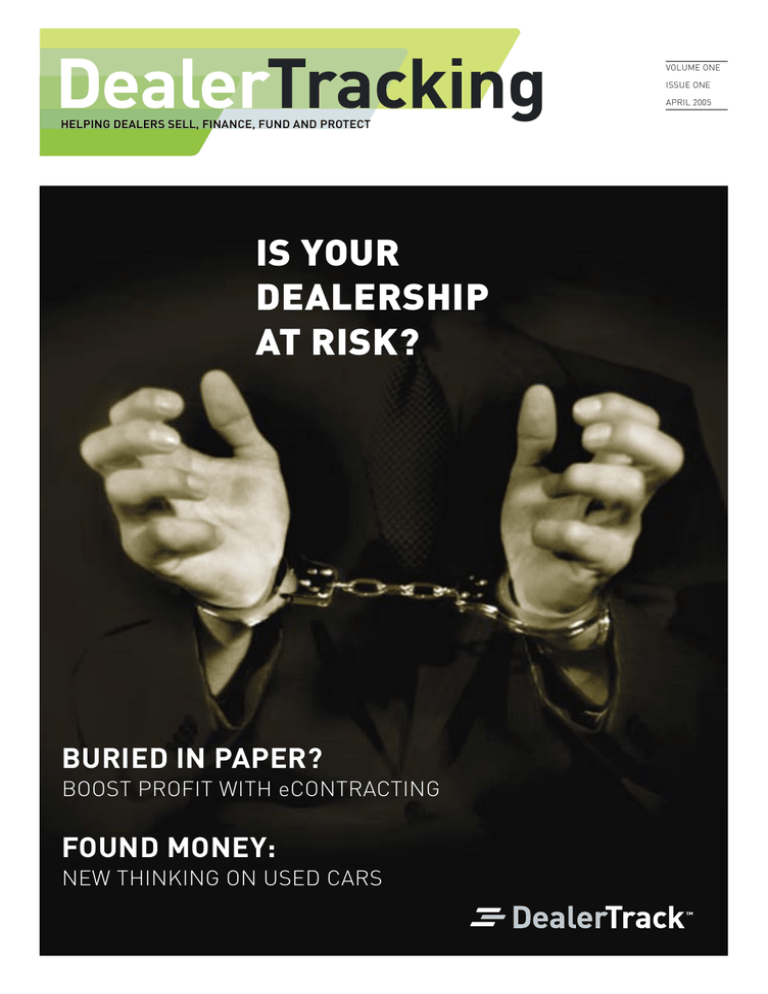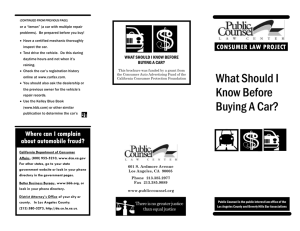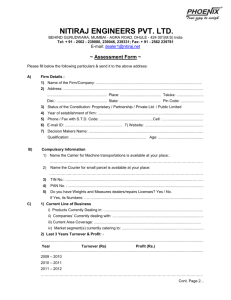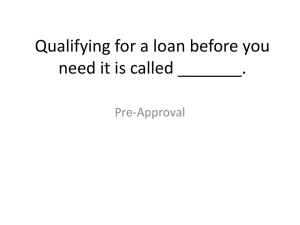
DealerTracking
HELPING DEALERS SELL, FINANCE, FUND AND PROTECT
IS YOUR
DEALERSHIP
AT RISK?
BURIED IN PAPER?
BOOST PROFIT WITH eCONTRACTING
FOUND MONEY:
NEW THINKING ON USED CARS
VOLUME ONE
ISSUE ONE
APRIL 2005
Welcome to DealerTracking!
The goal of this publication is to provide
dealers with unique insights into better
ways to sell cars, finance customers,
get contracts funded quickly and protect
their businesses.
Over the past 20 years, we’ve witnessed a lot of changes
in how technology is used to sell and finance cars. What
was once carbon paper, mimeographs and phone calls
became fax machines, mainframe computers, dot matrix
printers, and standalone software systems.
The Internet transformed dealership technology yet again
– Web-connected PCs, and broadband Internet connectivity have become the standard on dealer desktops.
Today, state-of-the-art dealerships use integrated, Webbased applications and signature pads to get their deals
done quickly, easily and profitably.
Recently, many of our dealer customers have expressed
concern over the increasingly complex legal and regulatory environment. With compliance on everyone’s mind,
This magazine is not intended to provide legal or compliance advice.
You should review your specific compliance needs with an attorney
or regulatory compliance professional. © 2005, DealerTrack, Inc
we’re featuring it as our cover story. We hope it provides
insight into the steps you need to take to protect your
business.
We’re always interested in hearing from our more than
24,000 dealers – whether it’s ideas for our next issue
or how we can better serve you. Please feel free to
contact me at marko@dealertracking.com.
Thanks for your continued support, and enjoy our
inaugural issue!
Sincerely,
Mark O’Neil
President and CEO
DealerTracking Magazine
105 Maxess Road
Suite N109
Melville, NY 11747
Is Your Dealership At Risk?
Take steps now to be in compliance
and protect your profits
L
arge or small, today’s dealer is
duty-bound to comply with a
whole alphabet soup of acronyms.
They’re shorthand for a complex
web of federal and state laws aimed
at regulating consumer finance
and protecting customer financial
information.
“The last two years have felt like
we’ve been running through a meteor shower of legislation,” says Kevin
Reilly, a one-time attorney who’s now
General Manager and co-founder of
Alexandria Hyundai in Virginia. “And
failure to comply is not an option.”
Dealers beware. Federal and state
watchdogs have clearly been
ratcheting up their regulatory actions.
Even inadvertent violations of the
maze of rules can be shockingly
costly. Penalties can come in the
form of fines (the FTC can seek fines
of $11,000 a day for every violation),
lawsuits, and in rare instances,
even imprisonment.
“You hear all kinds of problems
from not being in compliance,” says
Brendan Walshe, Business Manager
of Webster Dudley Lincoln Mercury
in Dudley, Massachusetts. “There
was recently a woman in Connecticut who jointly bought a car with
her husband. When she died the
husband sued the dealership and
won a substantial damage award.
The dealer couldn’t show proof, as
the law requires, that the couple
was ever offered life insurance.”
Adding insult to injury, the penalties
being exacted against out-of-compli-
Dealers beware. Federal and
state watchdogs have clearly
been ratcheting up their
regulatory actions.
ance dealers are often trumpeted in
high-profile media coverage, further
darkening the already clouded lens
through which customers view you.
A recent CNN/USA Today/Gallup poll
showed a widespread disdain for
car dealers, just as it has since the
polls were first conducted in 1977.
When asked to rate the honesty
and ethical standards of people in
23 different professions, the public
ranked car salesmen at the very
bottom of the list.
The good news about compliance is
that, far from being your Achilles
1
The very real threats
posed by non-compliance
are avoidable once you
have a properly run
compliance program
in place.
heel, it can be a great advantage
to you. With a few modifications
to how you do business, you
can protect your operation from
potentially expensive legal as
well as “reputation” risks — and
increase your profitability.
When You’re in Compliance . . .
You minimize enforcement actions
and fines against your dealership
and even against you and your
staff personally
You minimize your exposure to lawsuits – class action or individual.
It can cost you hundreds of thousands of dollars to defend your
business against a regulatory
proceeding or lawsuit. Even if you
win, you lose – your attorneys’ fees
are not recoverable.
2
You minimize the potential for bad
publicity while you strengthen
customer relationships. As Reilly
observes, based on his dealership’s
experience, “From a customer acquisition and satisfaction standpoint,
customers have a good comfort level
when they provide us their sensitive
information.”
A General Framework for
Compliance
Admittedly, gaining a handle on
all the rules can be tough. As Joe
Collida, Finance Director of Downey
Chevrolet in Cooper, Texas, relates,
“Any time there’s a new reg, you can
get faxes from a dozen different
banks; you’ll see new regs suddenly
show up in new contracts; you get
bulletins. It can be confusing.”
You can begin making sense of
the confusion by thinking in terms
of a basic compliance framework
defined under what’s known as the
FTC Safeguards Rule. Issued under
the authority of the Gramm-LeachBliley Act, the FTC Safeguards Rule
requires that dealers:
Have a written information security
program, tailored for your operation, to secure the personal financial
information of customers.
Designate an employee to coordinate
the information security program.
Train employees to understand their
responsibilities in the process.
Have testing and response mechanisms in place to rectify problems.
COMPLIANCE TERMS DEFINED
ECOA (Equal Credit Opportunity Act) and
Federal Reg B – Prohibits discrimination
in lending terms and requires notices
to consumers in connection with credit
applications.
ESIGN (Electronic Signatures Act) –
Permits electronic signatures to substitute
for paper signatures in most consumer
and commercial transactions. Enables
electronic contracting of motor vehicle
retail installment sales.
FACT Act (Fair and Accurate Credit
Transactions Act) – A federal law that
limits financial information sharing,
provides identity theft protections, gives
consumers rights to access their credit
reports and requires detailed consumer
notices on credit reports and applications.
FCRA (Fair Credit Reporting Act) –
Governs the permissible use of credit
reports and requires disclosures to
consumers.
FTC Safeguards Rule – The Federal
Trade Commission’s rules that mandate
information security programs.
GLB (The Gramm-Leach-Bliley Act) –
A federal law requiring dealers to protect
the privacy of customers’ financial
information.
Onto this general framework, you
can hang the full range of laws and
regulations that run through all
aspects of your business, from sales
to credit decisions to F&I product
sales. The laws generally sort into
three main areas:
priate to your operation. Examples
include encrypting data; shredding
or securely storing paperwork; and
installing computer defenses like
firewalls. Violations of these rules
could mean anything from fines to
criminal penalties or lawsuits.
Laws Protecting Confidentiality
of Customer Data
These are the laws and regulations
that protect customers’ sensitive
financial information. They most
often are applicable on the sales
floor, where customers first provide
financial information as they apply
for credit.
Laws Documenting Credit
Decisions
If, for any reason, you as a dealer
decide not to send a customer’s
loan application to any financing
source, you may have the obligation
under FCRA and ECOA to send an
“adverse action notice” to your
customer notifying him or her of
your action. Under FCRA, it’s also
your responsibility to document
Complying with the FTC Safeguards
Rule means securing customer information using administrative, technical, and physical safeguards appro-
continued on page 8
Predatory Lending Laws – Protect
minority groups and women. These laws
generally enable private consumer lawsuits seeking damages, attorneys’ fees
and penalties.
The USA PATRIOT Act – A post-9/11
law that requires, among other things,
that creditors verify the identity of
customers.
TILA (Truth in Lending Act) and Federal
Regs M and Z – Provides for mandatory
disclosures in credit and leasing transactions and advertising of credit. Reg M
covers consumer leasing transactions.
Reg Z covers disclosures of credit terms
and advertising of credit.
UDAP (Unfair and Deceptive Acts and
Practices laws) – Includes FTC Act
Section 5 and similar state laws used
frequently by state attorneys general
to correct and obtain damages for consumer abuses by automobile dealers.
3
Buried in Paper?
Boost profit and CSIs
with eContracting
T
raditional paper-based contracting
is bloated with costs that erode
dealer profitability. The most obvious
cost is overnight shipping charges,
notes Tom Murray, Finance Director
at Koons Sterling Ford in Sterling,
Virginia. “But the biggest problem
is the turnaround time, the delay in
getting our money,” Murray says.
And if there’s a problem with the
contract, like a missing signature, the
customer may have to come back in
to the dealership, which creates a
CSI headache for everyone who was
involved in the sale. “Then we
usually have to give him a free tank
of gas or an oil change,” Murray adds.
Costs and Hassles
Even if the paper contracting process
works perfectly – the paperwork is
packaged and shipped immediately,
there are no errors, and the financing source funds the deal as quickly
as possible – the minimum costs
include overnight shipping charges
and at least a couple of days of carrying the contract-in-transit (measured
from the point the customer signs
the contract to the point the financing source releases the funds).
In the real world of paper contracting,
contracts often aren’t shipped
immediately, and errors are a fact
of life, pushing the average time to
fund a contract to about five days
(see sidebar). And the direct and
indirect costs to “recontract” a
deal – redo some portion of a paper
contract at the insistence of the
financing source – can be significantly higher. At the low end, recontracting may start with a tank of gas or
an oil change to keep your customer
happy. But the costs and hassles
escalate quickly, especially if you
don’t want to involve the customer
in correcting the errors. At the high
end, recontracting can mean eating
the cost of extra insurance products
that the financing source won’t
fund, or the additional basis points
the financing source says it has to
charge to fund the transaction. And
forget about the cost of repossessing a vehicle for those customers
who refuse to return to the dealership to complete the process.
4
The Dollars and Cents of eContracting
If you use DealerTrack’s eContracting for 300
vehicles a year, your direct savings versus
traditional paper contracting can average
close to $6,000. This estimate does not
include the less easily measured, but still
very real costs of fixing paperwork problems,
including employees’ time and what you
have to do to keep your customers satisfied.
Paper Electronic
Average Vehicle Price
Interest Rate
Days to Fund1
Inventory Costs
per Contract
Multi-part Forms
Overnight Shipping
Processing Cost
per Contract
Total Contracting Costs
Number of Vehicles
per Year
Annual Cost
Your Total Savings
$25,000
5.00%
5
$25,000
5.00%
1
$17.10
$3.42
$1
$5
$0
$0
$6
$0
$23.10
$3.42
300
$6,930
300
$1,026
$5,910
Days to fund is measured from the time the customer signs
the contrct until the financing source releases the funds.
1
Eliminating the Final Fifteen
Percent
Industry experts report problems
with approximately 15 percent of all
automotive paper contracts submitted for funding. In about a third of
those cases, the trouble is so serious that the customer has to return
to the dealership to complete the
process. Many dealers are turning
to electronic contracting as an
efficient, cost-effective way to avoid
the financial and customer dissatisfaction consequences of paper
contract errors.
“DealerTrack’s eContracting has completely eliminated problems in the
paperwork,” says Roger Koby, owner
of Koby Subaru in Mobile, Alabama.
“With the signature pad, customers
say it’s like going to Home Depot.”
One of the key features of eContracting is an electronic verification option,
which gives the financing source an
opportunity to review the final terms
of the contract before the consumer
actually starts signing. The exact
amount financed, additional details
about the transaction and all the
supporting math are checked to be
certain they’re within agreed-upon
parameters.
If the terms fall outside the pre-set
criteria in the financing source’s
automated decisioning system, the
contract is transferred into a review
process involving a human analyst.
Once the contract is verified, the
dealer can proceed with the contracting process and collect all required
signatures from the customer using
an electronic signature pad. And
every one of those signatures must
be collected, because each step
in the contracting process requires
them. Similarly, a copy of the
contract must be printed out so the
customer can review it – assisting
the dealer with compliance requirements in disclosing the deal. After
submitting the contract along with
supporting documentation, the
dealer knows for certain that the
deal will be funded – as fast as the
same day.
Championing technology like that
and saving money for the dealership
can make an F&I manager look
awfully smart. It also can enhance
the dealer’s image in the eyes of
increasingly tech-savvy consumers.
“The technology makes us look more
professional,” Koby says.“That’s
because when the deal comes back
eVerified, you know it’s all approved,
so then when you hit the ‘Submit’
button, you’re done – it’s as good
as gold.”
5
Found Money:
New thinking on used cars
V
ince Palmer, sales manager
of Market Motor Company in
Boardman, Ohio, wows his used
car customers with a full array of
lease-versus-purchase options
printed from the screen of his desking system. Mike Snyder, used car
manager at Moore Motors in rural
Caro, Michigan, analyzes his auction
sheets using the same technology
to determine which vehicles will
carry the best lease payments.
Both are riding the resurgent trend
in used car leasing, and routinely
find customers and profit in a sector
more often associated with luxury
brands. While the raw number of
leased used cars is relatively small
– an estimated 650,000 to 700,000
this year, according to CNW Marketing Research – a number of factors
promise to make used car leases
more eye-catching for both dealers
and customers in the near future.
Warranties Drive Demand
Used car certification programs
at General Motors and Toyota are
fueling growth in used car leases,
6
2004 Buick Regal GS
Mileage
1
Cap Cost/Sale Price
Front-End Gross
Cap Cost Reduction/Down Payment:
Money Factor (hypothetical):
Term
Monthly Lease payment
Lease1
19,377 mi.
$13,991
$2,841
$785
.00190
36 months
(approx. APR 4.56%)
$168
Purchase
19,377 mi.
$13,991
$2,841
$785
APR 8.00%
60 months
$284
Based on 12,000 miles/year
These are examples only, based on January data in the Midwest, and do not include taxes. For current accurate information
by state, go to DeskLink™ or call a DealerTrack representative.
1
says CNW President Art Spinella.
Attractive warranties on certified
vehicles are a key reason.
Jesse Toprak, senior analyst at
Edmunds.com, concurs: “Warranties
are very important. The worst-case
scenario for these customers is
that they’d have to pay for repairs,
and the car is not even theirs.” For
used cars that are not certified,
leasing could still make sense if
there is some factory warranty left,
or if an extended warranty is built
into the lease.
Upside Down Customers Benefit
Long loan terms on new vehicles
have left a significant number of
customers upside down at trade
time. While the average loan term
in 2004 was near 61 months, Raj
Sundaram, president of Automotive
Lease Guide, says the average
term of ownership was actually
closer to 45 months. Data from
Edmunds.com shows upside down
customers have, on average, $3,795
in negative equity.
Leasing a late-model car can benefit
these customers, explains Christine Buechler, a leasing expert with
DealerTrack, since consumers can
roll their negative equity into a
lease and still pay less than if they
financed. “Used car leasing is a
tremendous bargain for the right
customer, because it is based upon
depreciation, and depreciation on a
two- to five-year-old car is less,” says
Edmunds.com Senior Consumer
Advice Editor Philip Reed.
Technology Aids Selling and
Buying
Technology can help sell used car
leasing to web-savvy customers.
Market Motor’s Palmer finds great
value in desking solutions like
DealerTrack’s DeskLink™: “I can
show the customer everything from
the lowest monthly payment to
the highest, with all the deductibles.
And DealerTrack guarantees the
numbers.”
frequently, desking electronically
becomes critical to quoting a deal
that the customer can’t beat when
they shop around.
Without the technology, calculating
a single lease payment scenario can
take a half-hour. But a complete
desking solution cuts the time to a
minute or two – and delivers a full
array of lease-versus-purchase
options, including terms, monthly
payments, cap cost reduction and
money factors from participating
financing sources in the dealer’s
state. Since residual values, money
factors, and finance rates change so
Another technique is to use a
desking solution to analyze auction
sheets. Such unlikely models as
Tauruses and Escorts have turned
up listed alongside the predictable
high-residual BMWs.
Bottom line: Dealers can move even
more used cars by offering both
lease and finance options to their
customers.
7
Data Center
NUMBER OF FINANCING SOURCES USED
In December 2004, franchised
dealers submitted credit apps
to an average of 10 different
financing sources.
DEALER FINANCING SOURCE NETWORKS
25
FRANCHISED
INDEPENDENT
20
15
10
5
0
VERY SMALL
SMALL
MEDIUM
LARGE
JUMBO
DEALERSHIP SIZE BASED ON APPLICATIONS SUBMITTED
Source: December 2004 transaction data, DealerTrack, Inc.
Is Your Dealership At Risk
continued from page 3
that you have a “permissible
purpose” before you can pull a
customer’s credit report.
Under the USA PATRIOT Act, you
have to verify the identity of your
customer. Federal truth-in-lending
rules govern your disclosure of
credit terms and mean you’d be
well-advised to have a lawyer review
your communications to customers,
such as advertisements and the
wording in your forms.
Laws for Tracking Sales of F&I
Products
Under Section 5 of the FTC Act and
a variety of state laws such as those
prohibiting Unfair and Deceptive Acts
and Practices (UDAP), dealers must
clearly represent F&I products (such
as extended warranties) and their
prices to customers at the point of
sale. Items that a customer declines
to order should be clearly documented as well as those that are chosen.
Some dealers are even videotaping
8
these sales presentations to avoid
problems, but that practice remains
controversial and is not required.
Changing How You Work
It’s obvious that to be fully in compliance, you have to change the way
you work. But that’s now much
easier to do with a host of available
software programs. “Converting
processes to electronic format helps
in compliance, but also, quite often,
has the added benefit of enhancing
profitability,” says Reilly.
DealerTrack offers computer- and
web-based systems that help you
execute deals more consistently,
maintain control, track your progress
and streamline your overall business
— all while managing your compliance risk. For example . . .
MenuTrack™ is a cost-effective way
to scrupulously document aftermarket product presentations and sales.
eContracting makes it easy to
increase compliance in financing
while improving your cash flow. It
simplifies financing and documents
the lending process while enabling
dealers to electronically transmit
contract information to financing
sources.
AppOnline™ protects your customers’ privacy by giving them the
ability to submit a fully compliant,
encrypted credit application along
with their vehicle request through
your dealership’s website.
Long story short: The very real
threats posed by non-compliance are
avoidable once you have a properly
run compliance program in place.
You’ll protect your business’s profitability and boost customer satisfaction at the same time.
Best Practices
Q&A with
Randall Noe
For more than 20 years, Randall Noe has run multiple
dealerships profitably. He recently shared some of his
hard-won insights with DealerTrack. Mr. Noe owns Randall
Noe Ford/Mercury and Randall Noe Chrysler/Jeep/Dodge,
both located in Terrell, TX.
Somebody said recently that car dealers used to sell
cars, but now they sell deals . . . do you agree?
watches while we’re entering everything in the computer.
And then we review a menu with them.
Yes. When I was a salesman, you had to work at the state
fair for two weeks, and answer questions. Sales departments are so weak now, that the manufacturers hire
professional people to answer questions for people. And
that’s what it’s come to – sales people are no longer being
trained. Everybody wants to go to price right away, and
nobody knows the horsepower of the truck or the torque.
What is the best piece of advice that you received
when you started in the business?
Do you have a special training program for your
sales team?
Yes. How to sell the product, the features and the benefits
of the car, how to do a walk-around and demo ride.
What is your best source for new customers – print
advertising, the Internet, word of mouth?
I believe it’s a blend of all those things. We definitely see
the Internet playing a growing role in the business.
Why is your F&I department so successful?
We’ve developed relationships over the last 15 to 18
years with our banks, so they know we do business right,
that what we tell them is correct. You’ve got to develop a
good customer base, sell them, and give your banks good
people who will pay them back.
How have F&I revenues grown in your dealership?
We feel like every customer should come through the
finance department, to give them a good chance to have
an extended warranty, to have gap insurance, to have any
other product that we offer. We’re continuously training
everybody to make sure, ethically, we’re showing every
product to every customer. We have a computer presentation, five minutes and 20 seconds, that each person
Open your own mail. See what you’re paying for every
day when bills come in. It will tell you a lot. Be on your
parking lots. People have to see you or see upper management to know that they’re involved in the business.
What about technology?
I grew up in a store where it took them three weeks to
buy a fax machine. But if my F&I guys say they need
something, we put our heads together and they usually
get it that day. You just can’t worry about spending $5,000
on something to automate the store. You spend the 5,
and you might get back 20-fold. If you’re going to be fastpaced and satisfy the customer and your lenders, you’ve
got to have the right electronic equipment.
What is it about regulatory compliance that keeps
you up at night?
Losing the customer for life, and the 10 people he’ll tell
that to, and the bad press you’d get from it, is potentially
the worse thing that could happen.
Does an external organization need to reform F&I, or
can dealers regain public confidence themselves?
I think we do need some type of an ethics code, and I
believe there should be some licensing. I think good F&I
guys want to treat everybody like they treat their family.
Our philosophy here is treat them like you would if you
had them at your house. We all live here, in the community. I don’t want to go the grocery store on Sunday, and
have somebody say my F&I guy did something wrong.
9
PROTECTION
MenuTrack protects you by giving your finance team an online menu to present your
financial products correctly, each and every time. Increased compliance. More income.
More satisfaction for your customers. Beat the tag with MenuTrack.
MenuTrack now available in
TM
Are you in compliance?
© 2005, DealerTrack, Inc. All rights reserved.





